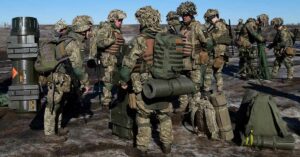DURING his recent visit to the Philippines, Ukrainian President Volodymyr Zelenskyy, in an interview with local media, said he saw similarities between his country’s conflict with Russia and the Philippines’ territorial dispute with China.
I think Zelenskyy is quite mistaken. The Ukraine crisis and the South China Sea (SCS) dispute are significant geopolitical issues, but their nature, origins, actors and geopolitical implications are fundamentally different. The Ukraine crisis is a direct military conflict with immediate and severe impacts on regional and global security dynamics. In contrast, the SCS dispute is a complex, multifaceted maritime conflict involving overlapping claims, various legal interpretations of Unclos, and significant economic and strategic stakes, which could adversely impact primarily regional peace, stability, security, regional and global trade security if not managed constructively, peacefully and diplomatically. Understanding these distinctions is crucial for formulating appropriate and effective foreign policy responses to each conflict under the current administration of Marcos Jr.
The Ukraine crisis revolves primarily around territorial integrity and sovereignty. The main actors are state actors — Russia and Ukraine — with significant involvement from Western countries, particularly NATO, led by the United States and the European Union. It’s an interstate conflict involving direct military engagement and conventional warfare. However, many observers have perceived the Ukraine crisis as a hybrid proxy war between the United States and its Western-led alliance against Russia.
On the other hand, the SCS dispute centers on territorial claims over maritime features and the associated maritime rights. Multiple countries, including China, Vietnam, the Philippines, Malaysia, Brunei and even the island of Taiwan, have overlapping claims. Hence, the SCS dispute is not just between the Philippines and China. It involves multiple regional state actors and regional powers, with the United States meddling in the dispute. The US has been interfering in the dispute, using the card of “freedom of navigation operations.” However, it’s important to note that as far as the US is concerned, these operations are about the free access of US warships in the waters of the SCS, not about commercial shipping and navigation.
Furthermore, it is important to note that the SCS dispute is complex, involving maritime law, territorial claims and resource exploration. While primarily nonmilitary, diplomatic bouts between claimant countries do occur. The dispute also involves intricate interpretations of the United Nations Convention on the Law of the Sea (Unclos) and a 2016 arbitral award that was rejected by China from the outset.
In terms of historical context, the Ukraine crisis is rooted in historical grievances, including Soviet-era borders, post-Soviet transitions, and, more particularly, Russia’s security concerns over Ukraine’s potential accession to NATO. The SCS dispute, on the other hand, involves centuries-old historical claims, colonial-era legacies and post-World War II treaties. Different countries use historical maps and records to justify their claims.
In terms of international responses and alliances, the Western alliance, led by the US, has responded strongly and unitedly to the Ukraine crisis, including economic sanctions, military aid to Ukraine and diplomatic efforts to isolate Russia. Whereas, there are varied and different responses among Southeast Asian nations and regional powers as far as the SCS dispute is concerned, with almost all Asean countries seeking good bilateral relations, understanding and economic cooperation with China while striking an independent foreign policy, balanced relations between China and the United States, and a political, diplomatic and peaceful resolution to the SCS dispute. With the exception of the Philippines which has leaned more toward strengthening military and defense ties with external powers like the US under Marcos Jr. amid the intensifying China-US strategic rivalry and competition. Note that the US has increased its military presence in the Philippines as it emphasizes freedom of navigation and security partnerships with its Asian-Pacific allies.
If, in any case, one draws a parallelism between the case of Ukraine in the Ukraine crisis and the dispute between the Philippines and China over the SCS, it reveals a stark reality. Ukraine, caught in a hybrid proxy war, serves as a tool for the United States and its Western allies to weaken Russia. Similarly, under Marcos Jr., the Philippines finds itself as a strategic pawn/proxy for the US in its broader contest and strategic rivalry and competition with China in the Asia-Pacific region. This situation underscores a challenging truth that Filipinos must navigate amid geopolitical tensions.
Implications
On the other hand, Zelenskyy’s recent visit to Manila and its implications for potential geopolitical ripple effects, considering the ongoing Ukraine crisis and its implications for regional security in Southeast Asia, deserve attention and consideration.
The Philippines’ position on the Ukraine conflict carries significant weight, as it may influence diplomatic relations with other countries involved, like Russia, or be affected by it. By openly supporting Ukraine, the Philippines is strengthening its ties with the Western alliance led by the United States. Marcos openly supporting Zelenskyy in the Ukraine conflict is akin to a declaration that the Philippines has chosen a side: the side of the US and the Western alliance vis-a-vis Russia. This is quite glaring but not a prudent move on the part of Marcos Jr. The best position for the Philippines is to stay neutral while advocating for a political solution/settlement of the Ukraine crisis, de-escalation of the crisis and a peace deal to be reached by both parties, Russia and Ukraine. Marcos Jr.’s position and open support for Zelenskyy are misguided and futile in every possible sense and do not benefit the Philippines tangibly. The Philippines has to be reminded that the Ukraine crisis is a hybrid proxy war between the US and its Western alliance against Russia. That is the fact of the matter. Navigating these dynamics requires foresight and prudence; neutrality is the best course forward.
On the other hand, Zelenskyy’s visit to Manila and meeting with Marcos Jr. have implications for the Philippines’ relations with Russia, given the Philippines’ expressed support for Ukraine. Potentially, it may strain diplomatic relations with Russia. By openly supporting Ukraine and condemning Russia’s actions in Ukraine, even indirectly, the Philippines is taking a stance against Russia in many ways. Russia could view such support for Zelenskyy as antagonistic, significantly affecting the Philippines’ diplomatic standing.
Conclusion
Given the escalating diplomatic and political tensions between the Philippines and China over the South China Sea dispute and the Taiwan Strait issue — exacerbated by the establishment of EDCA bases, some of which are positioned facing Taiwan — President Marcos’ administration appears to be fostering an adversarial and confrontational relationship with China. In this context, the question arises: Can the Philippines afford to risk creating another potential adversary in Russia due to Marcos’ explicit support for Zelenskyy and his regime in Ukraine? Seriously?
By openly supporting Zelenskyy and his regime in Ukraine, is the Philippines seriously considering adding Russia to our list of potential adversaries? Really? Oh, wow! How brilliant! What could possibly go wrong, except China and Russia are two of the most powerful countries in the world, especially militarily speaking? Really? Seriously? This is madness! Indeed, the potential ramifications of Marcos Jr.’s stance on all these warrant careful consideration and prudence.
Source: The Manila Times
https://www.manilatimes.net/2024/06/08/opinion/columns/implications-of-zelenskyys-visit-and-meeting-with-pbbm/1950406



